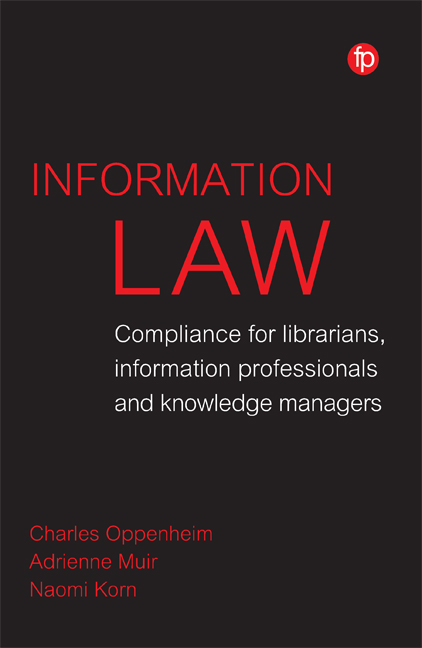Book contents
- Frontamtter
- Contents
- List of Acronyms
- List of Figures and Tables
- List of Case Studies
- Introduction
- 1 Copyright and Related Rights
- 2 Data Protection
- 3 Freedom of Information
- 4 Governance, Audits and Risk Assessment
- 5 Policies
- 6 Procedures: Copyright and Related Rights
- 7 Procedures: Using and Negotiating Licences for Access to Information Resources
- 8 Procedures: Data Protection and Freedom of Information
- 9 Tools and Templates
- 10 Awareness and Engagement
- 11 Some Speculations About the Future
- Appendix 1 Carrying out an Information Asset Audit
- Appendix 2 Sample IP Policy
- Appendix 3 Sample Data Protection Policy
- Appendix 4 Possible Contractual Terms for Online Access to Database Service
- Appendix 5 Data Protection Privacy Notice Template
- Bibliography
- Index
1 - Copyright and Related Rights
Published online by Cambridge University Press: 29 July 2020
- Frontamtter
- Contents
- List of Acronyms
- List of Figures and Tables
- List of Case Studies
- Introduction
- 1 Copyright and Related Rights
- 2 Data Protection
- 3 Freedom of Information
- 4 Governance, Audits and Risk Assessment
- 5 Policies
- 6 Procedures: Copyright and Related Rights
- 7 Procedures: Using and Negotiating Licences for Access to Information Resources
- 8 Procedures: Data Protection and Freedom of Information
- 9 Tools and Templates
- 10 Awareness and Engagement
- 11 Some Speculations About the Future
- Appendix 1 Carrying out an Information Asset Audit
- Appendix 2 Sample IP Policy
- Appendix 3 Sample Data Protection Policy
- Appendix 4 Possible Contractual Terms for Online Access to Database Service
- Appendix 5 Data Protection Privacy Notice Template
- Bibliography
- Index
Summary
Introduction
Copyright is the exclusive and assignable legal right, initially given to the author of an original work for a fixed number of years, to reproduce, print, publish, disseminate electronically, perform, or record their creative material. The word ‘initially’ is used, as the author can and often does assign the copyright, i.e. transfer the copyright ownership, to a third party, such as a publisher. Assignment is discussed further below. In order to use copyright materials, you have to know what it is and the difficulties and opportunities copyright can create.
In the UK, copyright law is primarily based on the Copyright, Designs and Patents Act 1988 and subsequent revisions, including the Copyright and Related Rights Regulations 2003, SI 2003/2498, various Copyright Rights in Performances Regulations 2014, some sections of previous Copyright Acts 1911 and 1956, various European Union (EU) Directives (most of which have been transposed into UK law by means of Statutory Instruments), international treaties that the UK has signed up to and case law from UK Courts and the European Court of Justice (ECJ). The key points to note about copyright are as follows:
◆ Copyright is an economic right granted exclusively to the creator(s) of an original work, which must be in some tangible or fixed format, to either permit or to prevent other people from copying, and doing certain other things (known as ‘restricted acts’ – see further discussion below), to it. If someone does carry out a restricted act on a copyright work without permission, they may have infringed the copyright, and the copyright owner is entitled to sue in a civil court case and seek forms of redress, such as damages for loss of income, destruction of infringing copies, etc. There are also certain circumstances where carrying out or enabling infringement becomes a criminal offence.
◆ In most countries of the world, including the UK, copyright is automatic. In other words, there are no formalities one has to go through, or fees to be paid, to acquire copyright.
◆ Copyright does not protect an idea, but it can protect the material expression of the idea.
◆ Works are protected regardless of their merit, although they need to be original (i.e. not copied from something else) and show some level of skill and judgement in their creation.
- Type
- Chapter
- Information
- Information LawCompliance for Librarians, Information Professionals and Knowledge Managers, pp. 1 - 18Publisher: FacetPrint publication year: 2020



